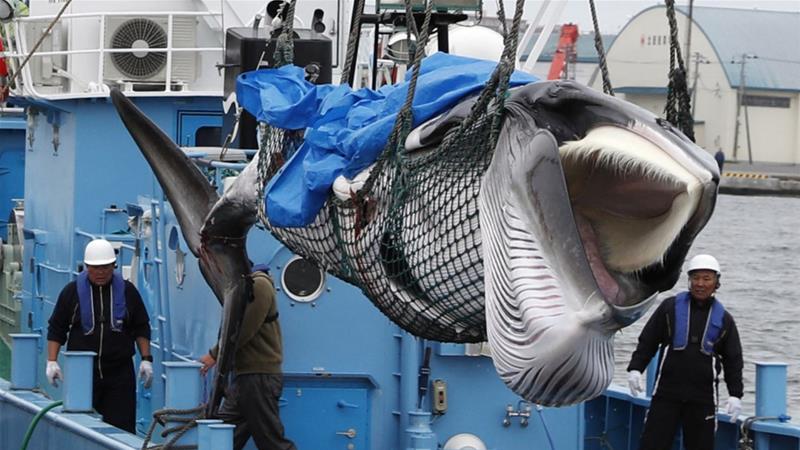Those hoping for a revival of the country’s struggling whaling industry may be disappointed
From The Economist
Should whales be hunted for profit?
Japan is one of a handful of countries that says yes. In December the country announced it was leaving the International Whaling Commission (IWC)—its first withdrawal from an international body since the second world war—and would no longer abide by a global moratorium imposed by the IWC in 1986.
Today Japanese whaling vessels set sail to hunt whales commercially for the first time in more than three decades.
A captured minke whale is unloaded from a whaling ship at a port in Kushiro, Hokkaido Prefecture on July 1, 2019.
Japanese whalers brought ashore their first catches on July 1 as they resumed commercial hunting after a three-decade hiatus.
The Fisheries Agency said the hunts will stay within the country's exclusive economic zone
[see Kyodo via Reuters]
Environmentalists and whale enthusiasts may despair, but some believe Japan’s decision may in fact be a face-saving admission that its long, expensive campaign to reverse the IWC’s moratorium is over.
courtesy of Reuters
As Patrick Ramage of the International Fund for Animal Welfare, a conservation charity, recently told the Associated Press, “what we are seeing is the beginning of the end of Japanese whaling.”
courtesy of FT
For a start, Japan will no longer send ships on “scientific” whaling expeditions to the Antarctic, a practice criticised internationally as commercial whaling in disguise.
Future hunts will be restricted to Japanese waters, and within the country’s exclusive economic zone. To prevent overhunting, commercial fishermen will be subject to a quota, currently set at 227 whales through the end of the year (in 2015 Japan reported taking 520 whales).
Whaling ships which are set to join the resumption of commercial
whaling at anchor at a port in Kushiro, Hokkaido Prefecture, Japan, June
30, 2019.(Reuters)
Such quotas may be unnecessary.
In the mid-1960s, Japanese fishermen hauled in nearly 25,000 whales (see chart).
Since then the country’s whaling industry has shrunk to just a handful of small companies employing barely 300 people.
Most Japanese, outside a handful of coastal towns, have lost their appetite for whale.
Annual demand for whale meat has plummeted from 200,000 to 5,000 tonnes (equivalent to roughly 40 grams per person).
Much of that piles up unsold in supermarket freezers.
Links :
- NY Times : Japan Resumes Commercial Whaling. But Is There an Appetite for It?
- FT : Japan restarts commercial whaling after 31 years
- The Guardian : Japan resumes commercial whaling for first time in 30 years
- BBC : Japan's commercial whaling fleet sets sail
- The Telegraph : Japan poised to resume commercial whaling after 30-year hiatus
- DW : Japanese fleet restarts commercial whaling
- WP : Japan returns to business of whale hunting. But whales may be better ...
- Quartz : Japan will resume commercial whaling in July after a 30-year break
- Japan today : Raw, fried or on a bun: the many ways Japanese eat whale
- Reuters : Outlook uncertain for Japan's whaling industry despite commercial ...





No comments:
Post a Comment